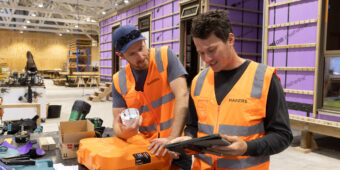Maximising a migrant workforce (part 1)
05 Jun 2014, Business Tips, Prove Your Know How

If you’re thinking about employing migrant workers, a little planning can go a long way. Preparing foreigners for life and work in New Zealand will help them adapt quicker, which can only mean good news for your business.
Migrant workers can help fill labour and skill shortages in the construction sector – but how well they do that can depend on how quickly and successfully they adapt to Kiwi culture, both inside and outside the workplace. Employers can help by preparing prospective overseas employees for life in New Zealand; in doing so, you can help maximise their productivity within your business.
Immigration New Zealand provides some simple tips that can make all the difference to settling and retaining migrant workers in its helpful guide Are You Employing Migrant Construction Workers?
Over the next few issues of Under Construction, we’ll continue to feature content from this guide; so that when you encounter issues, you’ll have a better idea of how to deal with them.
Planning ahead
It’s a good idea to employ migrant workers before your workload peaks. Once hired, prepare some information that will help them fit into the workplace and the culture more quickly.
You could:
- Meet your workers when they arrive in town and give them a tour of the area.
- Give them a welcome kit that includes local community information and important contact details, including your own and that of the nearest Settlement Support office (there are 18 around the country).
- Advise them where to buy food, clothes and other basic needs, and the location of schools and medical centres.
- Help them or give them some time to make personal arrangements, such as opening a bank account, organising an IRD number and getting a mobile phone.
- Check they have a valid driver licence for their own country and help them get some transport. Visitors with a valid overseas driver licence can drive in this country for a maximum of 12 months, after which they will need to apply for an NZ licence. The New Zealand Transport Agency has more information and a useful guide, ‘What is different about driving in New Zealand’, available online.
- Put on a social event to welcome your new worker (and their family) to the team and to the neighbourhood.
- Let them know about any social activities, religious groups or clubs they can join.
- Make sure they get to have a chance to experience New Zealand and its culture.
“Employers can help by preparing prospective overseas employees for life in New Zealand; in doing so, you can help maximise their productivity within your business
Create a Welcome Kit
Some companies have developed a Welcome Kit for new workers, which they give to them before leaving their home country.
A Welcome Kit should contain information on:
- The travel and arrival process.
- Expectations on the job, such as timeliness, honesty and openness.
- An overview of New Zealand, including arts, sports, and Māoritanga.
- Advice on the New Zealand climate and clothing requirements.
- New Zealand language and culture (including New Zealand management and communication culture, plus construction industry jargon and slang).
- What to do in an emergency.
- Local community health services.
- Driving in New Zealand (road rules and driver licensing).
- Food and commodity prices.
- The local area.
- Accommodation advice.
- Sending and receiving mail.
- Who to contact for advice and support.
Provide an orientation
A tailored orientation for migrants can be helpful because it:
- Sets out your expectations.
- Means fewer mistakes are made.
- Helps your new employee become familiar with your workplace and work practices.
Most orientation programmes include information about:
- Workers’ roles and responsibilities.
- Your expectations about employees’ work.
- Workers’ employment rights and obligations.
- Health, safety and hazards.
- Language and cultural differences.
NOTE: Remember, much of this preparation will only need to be done once and can be used for any subsequent overseas employees.
Tips from experienced employers about working with migrants
It makes a difference if you:
- are patient and can appreciate other ways of doing things
- have realistic expectations
- give the migrant time to take in new information
- assist them with basics, such as tax, phones and banking
- are open-minded and interested in other cultures
- consider whether your workers need to know more about other cultures
- can put yourself in the migrant’s shoes
- have a sense of humour
Register to earn LBP Points Sign in



